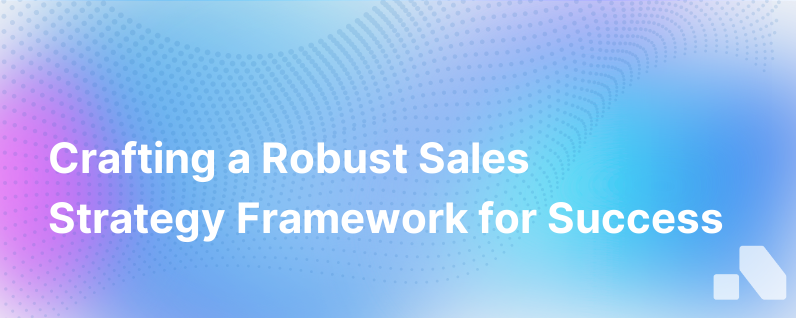
In the realm of B2B sales, the dynamics of selling processes are nuanced and complex. This intricate dance hinges upon understanding not just your product, but the intricate fabric of your customers' needs and challenges. Crafting a sales strategy framework isn't just about pushing a product; it's about creating value, fostering relationships, and enriching the customer's world with solutions that echo with their business ethos. The journey toward crafting this strategy involves meticulous planning, consistent execution, relentless tracking, and managing performance.
The Bedrock of B2B Sales Strategy
📈 Market Analysis and Targeting: Comprehending the marketplace serves as the bedrock to map out the landscape of where your business stands. Market analysis encompasses competitive scrutiny, understanding the market trends, grasping buyer behavior, and pinpointing the buying personas that demarcate the territory of your potential customers.
🎯 Defining Your Sales Goals: Sales goals should be the North Star for your sales efforts – realistic, attainable, yet challenging. Utilize historic data, align with business objectives, break them down into sales quotas, consider the sales cycle and above all, understand that these targets should thrust your sales team into a momentum that drives towards growth.
The Strategy Crux
🗺 Strategic Account Planning: Strategic insights on high-value accounts are vital. Account planning entails a deep-dive into your key accounts to carve out custom strategies that can lead to upselling or cross-selling opportunities. For instance, an understanding of the client's business processes may reveal potential fits not initially in scope, offering a wealth of unexplored sales opportunities.
🤖 Technology Utilization: Today, sales strategies are augmented by analytics and AI-driven insights. CRM systems, sales intelligence tools, and data analysis are the trellis on which modern sales strategies flourish. These technologies can churn out customer insights, predict buying patterns, and help in fine-tuning your sales pitch to resonate with the customer's expectations.
🔄 Sales Funnel Management: Crafting a fail-proof sales funnel stands imperative. The sales funnel should envision the journey of a prospect from an inquiry to a loyal customer. This requires optimizing each step - from generating leads, nurturing, proposal crafting, to the art of closing the deal. Pay heed to conversion rates at each stage, and consistently refine your approach based on the data gathered.
The Personal Touch
💼 Value Proposition and Messaging: Value has a narrative, and your sales strategy should be telling a story. The value proposition should be clean-cut, addressing your customer's pains and giving them a reason to believe in your solution. Every piece of content, every pitch, every demo should keep this story consistent and compelling.
🕵️♂️ Relationship Building: The quintessence of B2B sales lies not in transactions, but relationships. Relationship-building, especially with decision-makers and key stakeholders, should not be underestimated. Trust and credibility pave the way here – knowing who influences decisions and cultivating those connections are pivotal points in your sales strategy.
Monitoring and Growing
📊 Performance Tracking: Any strategy worth its salt is measurable. Key performance indicators (KPIs) such as quarterly sales growth, customer acquisition costs, lifetime value of a customer, churn rate, and conversion rates are the gauges on your sales dashboard. Performance tracking, in effect, guides the steady rudder of your sales ship, illuminating successes to replicate and gaps to bridge.
🔄 Agility in Strategy: Adaptability is the linchpin in today's ever-evolving marketplaces. Incorporate data insights, feedback loops, and market shifts into your sales strategy regularly to ensure it remains relevant and effective. A frozen-in-time strategy fosters missed opportunities and stagnation.
Final Thoughts
Integration of these elements into your overall sales strategy framework might seem daunting at first glance. But each plays an intricate part in the grand symphony that is B2B sales. With the market landscape perpetually altering, your sales framework should not be a static document but a living, breathing blueprint that evolves, grows, and strengthens over time.
For B2B startups, embracing these tenets can often be the difference between just surviving and categorically thriving in a fiercely competitive marketplace. And yes, while each business is on a quest to broaden their horizons, tools like Aomni have started to change the game, offering real-time insights and competencies that aid in crafting an informed and nuanced sales strategy framework. Aomni streamlines much of this process, hastening the time it takes to go from strategy to execution, ultimately freeing you to focus on the human aspect of B2B sales – nurturing relationships and understanding needs.
By putting these guidelines into action, each B2B sales initiative becomes not just an aim for immediate revenue but a chapter in a continuing narrative of customer success and sustained business growth.
Sources:
- 7 Elements of a Sales Strategy in 2024 | Issue 24 | Sales
- The Eight Great Components of an Effective Sales Strategy
- Identifying and understanding your target customer and market segments - MaRS Startup Toolkit
- Target Market Analysis: How to Identify the Right Customers
- Learn what are the key components of a successful sales strategy and how to align them with your customers' needs and buying journey.
- Learn how to use a systematic approach to segment your market and select your target customers for your strategy. Discover the steps, methods, and tools to identify and communicate with your potential customers.
- How to Do a Market Analysis (in Under 60 Minutes)
- Setting Sales Targets & Goals: How-To & Examples | Anaplan